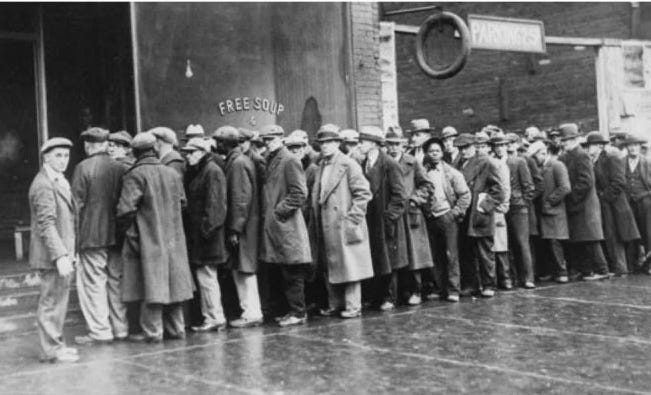Issue 09: Will the COVID-19 pandemic lead to lasting change in social policy?
While many countries have enacted massive financial support packages, we can look to past crises for guidance on whether any of it will prove durable
The COVID-19 pandemic has challenged global policy makers in ways unheard of in most of our lifetimes. This newsletter provides short, accessible briefings on as many of the relevant policy challenges as possible. Today’s briefing is by Daniel Béland (DB), the Director of the McGill Institute for the Study of Canada and James McGill Professor in the Department of Political Science at McGill University.
The ongoing COVID-19 global crisis has major implications for social policy. All over the word, many countries have already enacted massive social policy packages to help workers and families stay afloat during this unprecedented public health crisis, which is already having a dramatic impact on the economy and unemployment numbers.
In Canada, the early social policy response is embedded in the COVID-19 Emergency Response Act adopted on March 25, and the centrepiece of this bold legislation is the Canada Emergency Response Benefit (CERB). This temporary program provides “a taxable benefit of $2,000 a month for up to 4 months to support workers who lose their income as of result of the COVID-19 pandemic.”
Other key social policy measures featured in the COVID-19 Emergency Response Act include a temporary increase of Canada Child Benefit payments, a special top-up payment under the GST credit, a pause on student loan repayments, and a special fund to provide $500 million through the Canada Health Transfer. On March 27, prime minister Justin Trudeau also announced a 75 per cent wage subsidy for qualifying businesses, for up to 3 months, retroactive to March 15, 2020.
How does this compare to how other countries are responding? Like the temporary social policy measures enacted elsewhere, this early policy response is grounded in Keynesianism, an approach that uses deficit spending to reduce the scope, and the negative impact, of massive layoffs on the economy.
Beyond the clear similarities in the national responses to the current crisis rooted in Keynesianism, each country is responding to this ongoing situation differently for a number of reasons. This includes their fiscal capacity, the degree to which the crisis is affecting them, the nature of their political institutions (e.g. federal versus unitary states), and their existing policy legacies (i.e. the social policies already in place when the crisis began). In the case of the recent federal response, for example, it is likely that the CERB was enacted in part because Canada’s Employment Insurance (EI) is a rather ungenerous program by international (OECD) standards. While other countries that offered more comprehensive unemployment insurance before the COVID-19 crisis decided to expand them, the federal government decided to create a new, temporary program that to exist alongside our deeply flawed EI program.
While it is relatively easy to explain why some countries react differently than others to a new crisis, it is much harder to anticipate whether this crisis will lead to durable policy change beyond the temporary measures enacted towards the beginning of it. Yet historical and comparative analysis can help us better understand the conditions under which global crisis can lead to durable policy legacies in specific countries and policy areas. We can use historical examples from Canada and the United States to assess the condition under which large-scale economic and social crises can lead to durable policy change.

In Canada and the United States, the social protection provided to the unemployed at the beginning of the post-1929 Great Depression was limited in nature and provinces/states, just like municipalities and private charities, struggled to help the poor due to their limited fiscal and administrative capacity. In these two countries, over time the federal government got involved more directly, first with temporary programs like unemployment camps and public works and, later on, with permanent measures like unemployment insurance and, in the United States, old-age insurance, which is known today as Social Security. In the case of Canada, however, the federal unemployment program enacted in 1935 was deemed unconstitutional two years later, which lead to constitutional negotiations with Ottawa and the provinces that delayed implementation until 1941, after the end of the Great Depression.
In Canada and the United States, the Great Recession that began after the 2008 financial crisis was shorter than the Great Depression and in occurred in a different context from the 1930s, as major social support programs already existed in these two countries. But temporary measures were enacted in both countries to offer additional support to the unemployed, a situation that did not prevent many of them from falling between the cracks of flawed and limited safety nets for the unemployed. At the same time, although it proved shorter than the Great Depression, the Great Recession created favourable conditions for the enactment of durable and meaningful social policy reforms in both countries.
First, in the United States, the Great Recession further increased the number of people uninsured for medical care costs, which helped legitimize the enactment of Obamacare in 2010, despite calls from Republicans to postpone health reform until the return to economic prosperity. Second, in Canada, the Great Recession provided political ammunition to the New Democratic Party (NDP) and labour unions to advocate expansion of the Canada Pension Plan (CPP), something they had been advocating for some years. Although Conservatives under Stephen Harper refused to act, both the Liberals and the NDP included CPP expansion in their 2015 electoral platform and the Trudeau government reached a deal with the provinces over a relatively modest expansion of CPP.
As we face an unprecedented interrelated health and economic crisis with COVID-19, past crises can offer us lessons on how they might create the conditions for durable social policy change, beyond the temporary measures. One key factor to explain whether durable social policy emerges from a crisis is its sheer duration, as longer crises are more likely to lead to durable change — something the example of the Great Depression illustrates perfectly. Another factor is the institutional features of the country as it enters the crisis, combined with potential partisan shifts such as the election of FDR in 1932, the election of Obama in 2008, or even the rise of the Trudeau Liberals in late 2015. This last example as it relates to CPP reform suggests once again that crises can set into motion political processes that have an impact on social policy reform long after the crisis itself is over. The example of the delayed creation of unemployment insurance in Canada in 1941 also supports this claim.
When we want to understand why countries react to the ongoing COVID-19 crisis differently and how this crisis might lead to durable policy change, historical and comparative policy analysis help identify key factors we can monitor systematically, looking forward. Historical and comparative analysis helps us understand what is both unique and common about our present condition, a reality that allows us to pause and reflect on the past while navigating an uncertain future. (DB)
Related readings
Trudeau is recalling Parliament to get the COVID-19 package passed
China concealed the extent of the outbreak, says US intelligence
Experts are worried that Mexico’s response is too little, too late

Alberta is making a huge investment in the Keystone XL pipeline
The FDA is pulling heartburn pill Zantac off the market
With SpaceX, NASA is getting ready to launch astronauts again

Learn: This Anishinaabe outdoorsman is offering his outdoor survival classes online for kids
Follow: Potato or asteroid? The Astronomy Picture of the Day has the goods
Write: Got some time on your hands? Ian Fleming explains how to write a thriller
Wash:
______
Policy for Pandemics is produced and edited by Andrew Potter and co-edited by Charlotte Reboul and Paisley Sim (bios here) If you have any feedback or would like to contribute to this newsletter, please send an email to andrew2.potter@mcgill.ca





